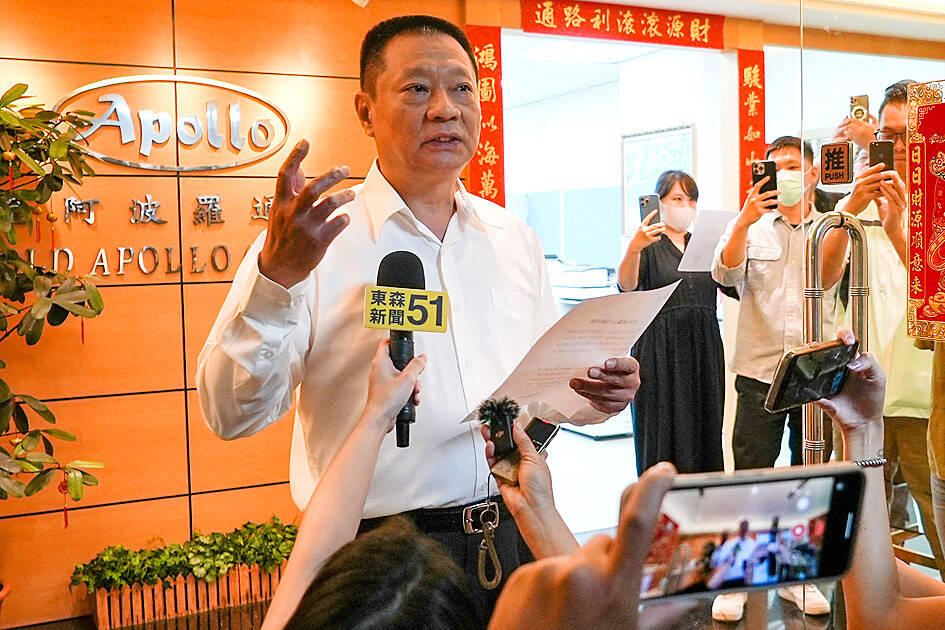Taiwanese firm Gold Apollo Co (金阿波羅通信) yesterday said that it authorized its brand on the pagers that exploded in Lebanon and Syria, but that another company based in Budapest manufactured them.
The pagers were manufactured by BAC Consulting KFT, based in Hungary’s capital, Gold Apollo said in a statement.
The company said the AR-924 pagers used by the Hezbollah militant group were produced and sold by BAC, which was authorized to use Gold Apollo’s trademark in some regions.

Photo: Yan Zhao, AFP
“We only provide brand trademark authorization and have no involvement in the design or manufacturing of this product,” it said.
“The product was not ours. It was only that it had our brand on it,” Gold Apollo founder Hsu Ching-kuang (許清光) said, adding that his company has had an authorization agreement with BAC for the past three years.
BAC has “cooperated with us and represents many of our products,” he said.
“We are a responsible company. This is very embarrassing,” he said, adding that the company was also a victim of the incident.
The Shilin District Prosecutors’ Office yesterday said that its national security division would launch an investigation into the case.
Gold Apollo had no record of directly exporting its products to Lebanon over the past few years, the Ministry of Economic Affairs said.
Products manufactured by Gold Apollo in Taiwan are mainly exported to Europe and North America, the ministry said.
The pagers made in Taiwan are only capable of receiving signals and use AA batteries, which are unlikely to cause fatal explosions, the ministry cited the company as saying.
The company exported about 260,000 pagers from 2022 to last month and 40,929 units in the first eight months of this year, ministry data showed.
Meanwhile, the National Communications Commission said that Gold Apollo’s business license to manufacture and sell radio frequency (RF) devices expired last year.
The Administrative Regulations on the Controlled Telecommunications Radio Frequency Devices (電信管制射頻器材管理辦法) require those seeking to import, sell, produce or display radio frequency devices in the nation must secure a certificate from the commission, the regulator said.
However, pagers are receivers of messages and are not controlled telecommunications RF devices, and such producers need not obtain a certificate, it said.
Manufacturers who sell RF devices to other countries should comply with the regulations in the target nations, it added.
A telecom expert who chose to remain anonymous told the Taipei Times it is surprising that such a small device can be used as a deadly weapon.
“The battery of a pager is much smaller than that of a smartphone and has limited energy storage capacity, so it is quite difficult to kill someone with a pager battery explosion,” the expert said.
A pager is not as tightly assembled as a mobile phone, which makes pagers easy to modify, the expert said.
“My guess is that explosive substances and denotation control mechanisms were added to the pagers before they were in the hands of users,” the expert said.
“It is very likely that the pager’s vibration function for incoming messages was used as part of the denotation control mechanism and a special incoming message command triggered the detonation,” they said.

SECURITY: As China is ‘reshaping’ Hong Kong’s population, Taiwan must raise the eligibility threshold for applications from Hong Kongers, Chiu Chui-cheng said When Hong Kong and Macau citizens apply for residency in Taiwan, it would be under a new category that includes a “national security observation period,” Mainland Affairs Council (MAC) Minister Chiu Chui-cheng (邱垂正) said yesterday. President William Lai (賴清德) on March 13 announced 17 strategies to counter China’s aggression toward Taiwan, including incorporating national security considerations into the review process for residency applications from Hong Kong and Macau citizens. The situation in Hong Kong is constantly changing, Chiu said to media yesterday on the sidelines of the Taipei Technology Run hosted by the Taipei Neihu Technology Park Development Association. With

CARROT AND STICK: While unrelenting in its military threats, China attracted nearly 40,000 Taiwanese to over 400 business events last year Nearly 40,000 Taiwanese last year joined industry events in China, such as conferences and trade fairs, supported by the Chinese government, a study showed yesterday, as Beijing ramps up a charm offensive toward Taipei alongside military pressure. China has long taken a carrot-and-stick approach to Taiwan, threatening it with the prospect of military action while reaching out to those it believes are amenable to Beijing’s point of view. Taiwanese security officials are wary of what they see as Beijing’s influence campaigns to sway public opinion after Taipei and Beijing gradually resumed travel links halted by the COVID-19 pandemic, but the scale of

A US Marine Corps regiment equipped with Naval Strike Missiles (NSM) is set to participate in the upcoming Balikatan 25 exercise in the Luzon Strait, marking the system’s first-ever deployment in the Philippines. US and Philippine officials have separately confirmed that the Navy Marine Expeditionary Ship Interdiction System (NMESIS) — the mobile launch platform for the Naval Strike Missile — would take part in the joint exercise. The missiles are being deployed to “a strategic first island chain chokepoint” in the waters between Taiwan proper and the Philippines, US-based Naval News reported. “The Luzon Strait and Bashi Channel represent a critical access

Pope Francis is be laid to rest on Saturday after lying in state for three days in St Peter’s Basilica, where the faithful are expected to flock to pay their respects to history’s first Latin American pontiff. The cardinals met yesterday in the Vatican’s synod hall to chart the next steps before a conclave begins to choose Francis’ successor, as condolences poured in from around the world. According to current norms, the conclave must begin between May 5 and 10. The cardinals set the funeral for Saturday at 10am in St Peter’s Square, to be celebrated by the dean of the College